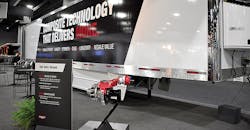Two years ago at TMC, Wabash National introduced the prototype of its molded structural composite (MSC) refrigerated trailer, and last year announced a limited production run of 100 units headed to fleets for real-world evaluation. This year, the company came to tout the success of their “vast departure” from traditional product and production methods, as Mark Ehrlich, general manager, vans, explained in an interview with Trailer/Body BUILDERS.
“There is nothing in North America that is like this,” Ehrlich explains with enthusiasm. “We’re taking a structural layer and an insulated layer, and combining the two. That’s where we get the efficiencies in design.
“We’ve seen it starting in the European market; however, their approach is more of a box with a chassis underneath it—so it’s not a monocoque trailer. This is really still the only monocoque-designed, fully composite trailer that I’ve seen. It’s essentially like a chassis that’s giving you your structural bridge stiffness, not necessarily the box itself.”
To build this all-new trailer, made from completely new materials and a unique design, Wabash set up MSC production at a recently shuttered fiberglass boat manufacturing facility in Little Falls MN.
“We’ve had significant operations improvements over the last 12 months, since the last time we showed this trailer,” Ehrlich said. “With the integration of composites, frankly, it’s refreshing to get away from the conventional construction product. I’m not at the mercy of conventional material shape, material properties, none of that. From a designer standpoint, it’s a greenfield [project]: You get to start again. And with that comes the inherent value proposition of the MSC trailer.”
In the past 12 months, Wabash MSC trailers have been on the road in sufficient numbers, logging sufficient miles, that the improved thermal efficiency of the composite design has proven itself on a cost/benefit basis, Ehrlich noted. He declined to discuss pricing, but did note that Wabash is “not looking for a subsidized approach to adoption.”
“Absolutely there is an ROI for this, based on the value alone, from a hard-dollars standpoint,” he said. “But seeding it into the market and the long-term plan are different conversations.”
Improving the operational profile—and the cost benefit for customers—means looking for opportunities beyond the thermal efficiencies of the MSC technology, he added.
“We’ve also been able to put out the first 24,000-pound floor rating with the reefer—that’s an attempt to mimic a dry van for either a backhaul, or even fronthaul options,” he said. “So the more we can make the equipment work in a multitude of applications, the more usable and valuable this trailer becomes to our customer base.”
The new MSC trailers also are holding up well.
“The road miles are important; we’ve hit almost all 48 contiguous states,” Ehrlich said. “So we’ve got all the routes that the MSC trailers have taken—we’ve hit them all—and we’re developing thousands of miles every day with this equipment. We’re excited to see no issues. We ran this on a couple of durability trials early on, pretty extensive, so no surprises there. They’re performing as expected—so far, so good.”
The challenge now, he explained, is to find the right “balance” of production capacity and demand, and at the same time to develop the processes needed for that production capacity to keep pace with increased demand in the future.
“What we’re concerned with is we don’t want to outpace demand with capacity, so that is controlled,” Ehrlich said. “I can say that the glide path for manufacturing is on track. We continue to invest in Little Falls. And with each investment comes incremental capacity gains. I can’t go into that fully, but I can tell you it’s on the upward tick as we scale and invest—you have to invest to be able to do that.”
He credited Wabash fleet customers and dealers with stepping up as “early adopters,” and added that—with the demonstrated success of the MSC product—the early adoption phase would indeed be drawing to a close.
“If you’re in the refrigerated space, you have to look and evaluate this technology,” he said. “It’s too good not to.”
For TMC 2020, Ehrlich declined to name a production target but he anticipates the discussion will be about the “hundreds of thousands” more miles for trailers with MSC technology, with an expanded customer base in more markets.
“Everything’s on track,” he said. “It’s exciting what we’re sitting on. Sometimes we have to throttle down our own excitement for what this could be.”
About the Author
Kevin Jones
Editor
Kevin has served as editor-in-chief of Trailer/Body Builders magazine since 2017—just the third editor in the magazine’s 60 years. He is also editorial director for Endeavor Business Media’s Commercial Vehicle group, which includes FleetOwner, Bulk Transporter, Refrigerated Transporter, American Trucker, and Fleet Maintenance magazines and websites.
Working from Beaufort, S.C., Kevin has covered trucking and manufacturing for nearly 20 years. His writing and commentary about the trucking industry and, previously, business and government, has been recognized with numerous state, regional, and national journalism awards.


